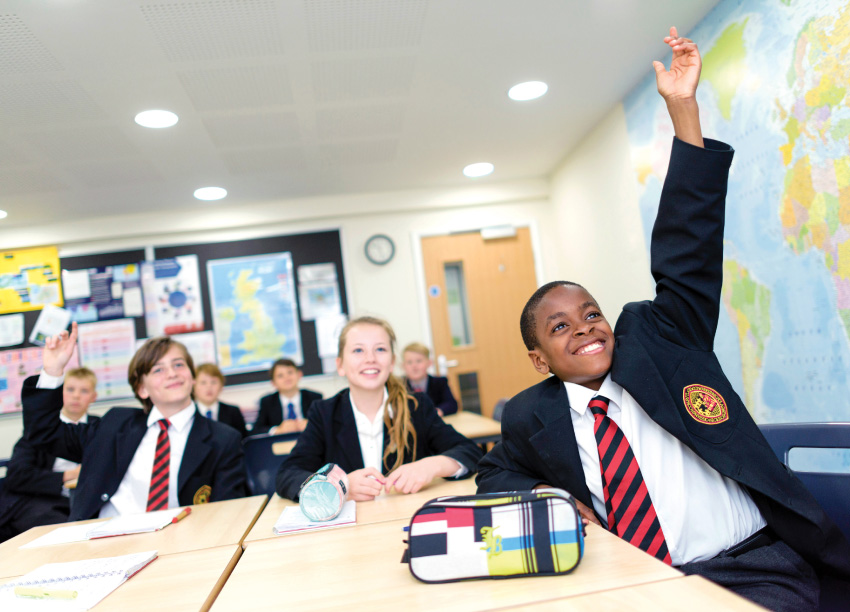Choosing an education fit for 2030+
Posted on 17th Dec 2018 in School News, International Baccalaureate, Which School?
David Harrow, Deputy Head (Academic), explains why Oakham School is introducing the IB’s Middle Years Programme.
That we live in changing times is not new: anyone from countless generations back through the ages, and across the globe, could have made a similar assertion. What is unprecedented is the rate of that change. There has been a great deal of speculation about the knowledge and skills that will be needed in the world of 2030 and, whilst no-one can predict the future with certainty, there is a remarkable degree of agreement on the broad sweep of qualities one is likely to require. Distilling the many conversations that have taken place, what is apparent is the importance of being able to think critically and creatively, to learn effectively and independently, to collaborate with others, and to manage copious information and ‘big data’. We can reasonably suppose that people may need to switch fields several times during their working lives, and that professions will change in nature quite profoundly.
So: the education we need to offer to our young people today has a lot riding on it, and a traditional ‘business as usual’ knowledge-based curriculum is unlikely to do the job.
The challenge we at Oakham are facing, as well as all schools across the country, indeed the world, is how can we best equip our students with the knowledge, aptitude and skills to thrive in the world of 2030 and beyond?
Like many independent schools, philosophically, and in practice, there is a great deal in an Oakham education that already provides a brilliant preparation for the world that awaits them when they leave education. At Oakham, this includes our nationally acclaimed FOSIL framework for inquiry learning, our broad and balanced ‘Total Curriculum’, and our focus on Learning Habits. As an ambitious school that has always been at the forefront of educational developments (we were one of the first independent schools to move to co-education in the 1970s, and to introduce the IB Diploma over 15 years ago), we have chosen to go even further to safeguard our students’ future readiness.
The Govian revolution has meant that there is a danger of an education from ages 11 to 14 becoming a relatively bleak and utilitarian preparation for the core subjects to come. These are vital years, where habits are formed, and enthusiasms are readily nurtured, and therefore, we believe, should be used to better effect.
Our solution to the challenge of equipping pupils for the world of 2030+ is to ensure that these three years, relatively free from the constraints of studying for examinations, are put to the very best possible use. That is why, from this September, Oakham School is embarking on the phased development and implementation of the internationally celebrated IB Middle Years Programme (IB MYP) for our students aged 11 to 14.
The IB MYP is a holistic, concept-based framework that puts the student at the centre and makes understanding a real priority. In a traditional curriculum, knowledge and skills are taught, with the hope that deep understanding follows: sometimes it does, but there is nothing systematic about that. One can end up with rather a disparate appreciation of particular subjects, possibly in some depth, but without an awareness of the bigger picture, and limited experience in bringing a variety of ideas together to deal with the complex, and sometimes rather messy, interdisciplinary problems that arise all the time in real life. By way of contrast, IB MYP units start with the ideas and concepts that one wishes to convey, and the knowledge and skills needed to support understanding the concepts follow from that.
The IB MYP is a framework for learning rather than just a curriculum. It is more than a set of subjects: it addresses students’ intellectual, social, emotional and physical well-being, and gives them the opportunities to develop the knowledge, attitudes and skills they need to manage complexity and take responsible action for the future. It helps them to understand how their learning fits into the bigger picture, and in the wider world: subjects are linked with local and global perspectives, and across the disciplines, sometimes in surprising but revealing ways. Inquiry is fundamental: students learn how to ask and answer great questions, big and small. They are inspired and enabled to use their learning to make things happen: they think about how action or service can arise from what they learn, and how individually and together they can make a difference.
Taken as a whole, the IB MYP brings together everything Oakham believes about education in a way that will give our young people the best opportunity to thrive in the world to come, whether at school, at university or in the world of work. As we are now able to develop an IB MYP programme for just three years, we can also retain the currency of GCSEs.
Klaus Schwab, Executive Chairman of the World Economic Forum, said that ‘there has never been a time of greater promise, or greater peril’. Whether one sees the future as scary, exciting, weird or just confusing, it is as well to be ready to actively take one’s part in it as a responsible, prepared global citizen. At Oakham, we believe that the IB MYP is the best way we can give our young people the opportunity to do exactly this.